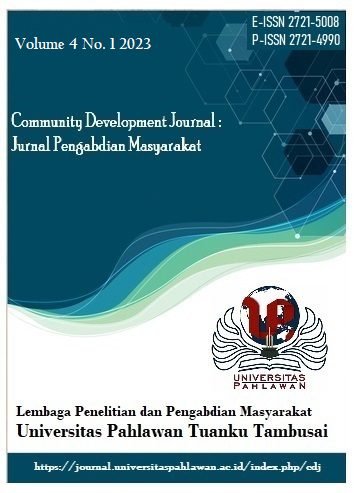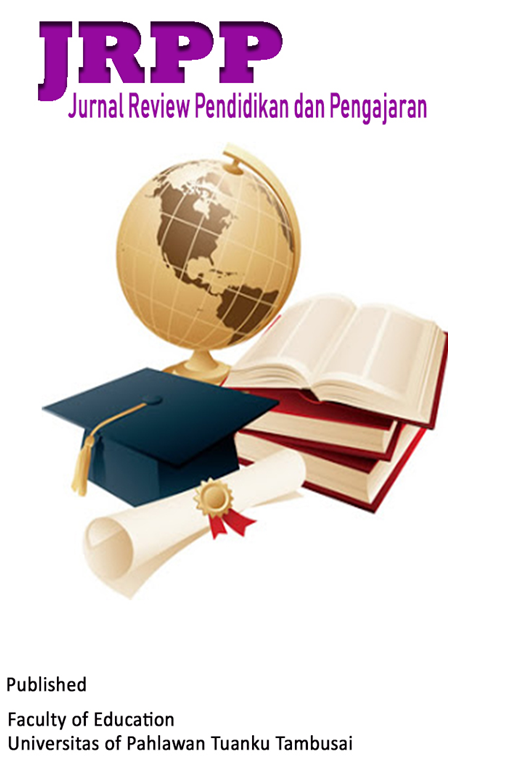DETERMINANTS OF EMPLOYEE DEDICATION TO THE COMPANY AS A WHOLE
DOI:
https://doi.org/10.31004/cdj.v4i1.12454Keywords:
Dedication, Employee, Company, Human ResourceAbstract
One of the strengths of the company lies in the quality of human resources. The way an organization treats and values its employees will have an impact on how strong and competitive the organization is in facing challenges and competition. The purpose of this research is to analyze the main elements that are generally carried out consistently by large companies that make employees feel at home and fully dedicate their abilities to the organization. This research includes library research, because the research was conducted to search, analyze, make interpretations and generalizations from the facts of the results of thoughts and ideas written by business psychology experts. This research is descriptive qualitative with a secondary data analysis approach. This study found that employees will give full dedication if the company pays attention to several factors including respecting employee needs, developing responsibility as an effort to retain employees, internal training and development, and the ability to retain employees. This research is expected to enrich business psychology literature and become a reference for organizations when managing HR.References
Alayo?lu, N. (2012). Mentoring: An ancient training and career development method. TODA?E’s Review of Public Administration, 45(2), 103–131.
Ausat, A. M. A. (2023). The Application of Technology in the Age of Covid-19 and Its Effects on Performance. Apollo - Journal of Tourism and Business, 1(1), 14–22. https://doi.org/10.58905/apollo.v1i1.8
Ausat, A. M. A., & Peirisal, T. (2021). Determinants of E-commerce Adoption on Business Performance: A Study of MSMEs in Malang City, Indonesia. Journal On Optimizations of Systems at Industries, 20(2), 104–114. https://doi.org/10.25077/josi.v20.n2.p104-114.2021
Ausat, A. M. A., Siti Astuti, E., & Wilopo. (2022). Analisis Faktor Yang Berpengaruh Pada Adopsi E-commerce Dan Dampaknya Bagi Kinerja UKM Di Kabupaten Subang. Jurnal Teknologi Informasi Dan Ilmu Komputer (JTIIK), 9(2), 333–346. https://doi.org/10.25126/jtiik.202295422
Ausat, A. M. A., & Suherlan, S. (2021). Obstacles and Solutions of MSMEs in Electronic Commerce during Covid-19 Pandemic: Evidence from Indonesia. BASKARA: Journal of Business and Entrepreneurship, 4(1), 11–19. https://doi.org/10.54268/BASKARA.4.1.11-19
Ausat, A. M. A., Suherlan, S., Peirisal, T., & Hirawan, Z. (2022). The Effect of Transformational Leadership on Organizational Commitment and Work Performance. Journal of Leadership in Organizations, 4(4), 61–82. https://doi.org/10.22146/jlo.71846
Ausat, A. M. A., Widayani, A., Rachmawati, I., Latifah, N., & Suherlan, S. (2022). The Effect of Intellectual Capital and Innovative Work Behavior on Business Performance. Journal of Economics, Business, & Accountancy Ventura, 24(3), 363–378. https://doi.org/10.14414/jebav.v24i3.2809
Bai, J., & Liu, J. (2018). A Study on the Influence of Career Growth on Work Engagement among New Generation Employees. Open Journal of Business and Management, 06(02), 300–317. https://doi.org/10.4236/ojbm.2018.62022
Basri, M. (2001). Metodologi Penelitian Sejarah. Restu Agung.
Bondarouk, T., Parry, E., & Furtmueller, E. (2017). Electronic HRM: four decades of research on adoption and consequences. The International Journal of Human Resource Management, 28(1), 98–131. https://doi.org/10.1080/09585192.2016.1245672
Boudlaie, H., Mahdiraji, H. A., Jirandeh, M. S., & Vahid, J.-S. (2022). The role of human resource management in the growth of startups: a multiple case study from the perspective of entrepreneurs and employees. World Review of Entrepreneurship, Management and Sust. Development, 18(3), 307–324. https://doi.org/10.1504/WREMSD.2022.122540
Davidescu, A. A., Apostu, S.-A., Paul, A., & Casuneanu, I. (2020). Work Flexibility, Job Satisfaction, and Job Performance among Romanian Employees—Implications for Sustainable Human Resource Management. Sustainability, 12(15), 1–53. https://doi.org/10.3390/su12156086
Ghani, B., Zada, M., Memon, K. R., Ullah, R., Khattak, A., Han, H., Ariza-Montes, A., & Araya-Castillo, L. (2022). Challenges and Strategies for Employee Retention in the Hospitality Industry: A Review. Sustainability, 14(5), 1–26. https://doi.org/10.3390/su14052885
Guinot, J., & Barghouti, Z. (2019). The value of trust in employees: discovering its effects on participation and motivation. Universia Business Review, 5, 1–39. https://doi.org/10.3232/UBR.2019.V16.N3.03
Helmi. (2022, December). Manajemen Perusahaan PT. Unilever Indonesia. Kumparan.Com. https://kumparan.com/helmisaham6/manajemen-perusahaan-pt-unilever-indonesia-1zPY4HlvYLt
John, J. (2010). Relevance of Employee Development Plans in Employee Performance Management. SSRN Electronic Journal, 10, 1–21. https://doi.org/10.2139/ssrn.1711647
Kamar, K., Lewaherilla, N. C., Ausat, A. M. A., Ukar, K., & Gadzali, S. S. (2022). The Influence of Information Technology and Human Resource Management Capabilities on SMEs Performance. International Journal of Artificial Intelligence Research, 6(1.2), 1. https://doi.org/https://doi.org/10.29099/ijair.v6i1.2.676
Katharina, L. P. P., & Dewi, A. A. S. K. (2020). The Effect of Career Development on Employee Performance through Work Satisfaction as a variable of Mediation. International Journal of Business, Economics and Law, 22(1), 1–7.
Khootimah Az-zaakiyyah, H., Hidayat, F., Ausat, A. M. A., & Suherlan, S. (2022). Islamic Rural Bank Employee Performance: Role of Motivation, Compensation, and Work Environment. EkBis: Jurnal Ekonomi Dan Bisnis, 6(1), 44–58. https://doi.org/10.14421/EKBIS.2022.6.1.1551
Kraugusteeliana, Surjati, E., Ausat, A. M. A., Pramono, S. A., & Prabu, H. K. (2022). A Literature Review on the Application of Technology During Covid-19 and Its Relationship to Performance. International Journal of Artificial Intelligence Research, 6(1.2), 1. https://doi.org/https://doi.org/10.29099/ijair.v6i1.2.765
Napitupulu, S., Haryono, T., Laksmi Riani, A., Sawitri, H. S. R., & Harsono, M. (2017). The impact of career development on employee performance: an empirical study of the public sector in Indonesia. International Review of Public Administration, 22(3), 276–299. https://doi.org/10.1080/12294659.2017.1368003
Nguyen, C., & Duong, A. (2021). Employee retention: do training and development, job satisfaction and job performance matter? The 4th International Conference on Business, 349–359.
Nur’aeni, Ausat, A. M. A., Purnomo, Y. J., Munir, A. R., & Suherlan. (2022). Do Motivation, Compensation, and Work Environment Improve Employee Performance: A Literature Review. International Journal of Artificial Intelligence Research, 6(1.2), 1. https://doi.org/https://doi.org/10.29099/ijair.v6i1.2.678
Prasetya, A. (2018). Analysis of Factors that Influence Employee Performance (Study on Permanent Employees in Operational Section of PT WIMCycle Indonesia-Surabaya). Jurnal Profit|, 12(1), 1–12.
Proto, E. (2016). Are happy workers more productive? IZA World of Labor, 12, 1–8. https://doi.org/10.15185/izawol.315
Sánchez-Hernández, M. I., González-López, Ó. R., Buenadicha-Mateos, M., & Tato-Jiménez, J. L. (2019). Work-Life Balance in Great Companies and Pending Issues for Engaging New Generations at Work. International Journal of Environmental Research and Public Health, 16(24), 1–18. https://doi.org/10.3390/ijerph16245122
Setiawan, I., & Prasojo, S. (2021). Effect of Talent Management and Employee Engagement on Turnover Intention with Employee Retention Mediation. Journal of Business, Management, and Accounting, 3(2), 55–63.
Sleekr. (2017, May). 5 Strategi HR yang Bisa Dipelajari dari Unilever. Sleekr Blog. https://sleekr.co/blog/strategi-hr-yang-bisa-dipelajari-dari-unilever/
Soeharso, S. Y. (2020). PSIKOLOGI BISNIS - Cara Baru Mengelola Bisnis (W. Setiadi, Ed.; 1st ed.). Lautan Pustaka.
Subagja, A. D., Ausat, A. M. A., & Suherlan. (2022). The Role of Social Media Utilization and Innovativeness on SMEs Performance. Jurnal IPTEK-KOM (Jurnal Ilmu Pengetahuan Dan Teknologi Komunikasi), 24(2), 85–102. https://doi.org/https://doi.org/10.17933/iptekkom.24.2.2022.85-102
Tessema, M. T., Tesfom, G., Faircloth, M. A., Tesfagiorgis, M., & Teckle, P. (2022). The “Great Resignation”: Causes, Consequences, and Creative HR Management Strategies. Journal of Human Resource and Sustainability Studies, 10(01), 161–178. https://doi.org/10.4236/jhrss.2022.101011
Yoon, H. J., Chang, Y.-L., Sadique, F., & al Balushi, I. (2021). Mechanisms for Hopeful Employee Career Development in COVID-19: A Hope-Action Theory Perspective. Advances in Developing Human Resources, 23(3), 203–221. https://doi.org/10.1177/15234223211017848
Zainee, I. A., & Puteh, F. (2020). Corporate social responsibility impact on talent retention among Generation Y. Revista de Gestão, 27(4), 369–392. https://doi.org/10.1108/REGE-06-2019-0070

Downloads
Published
How to Cite
Issue
Section
License
Copyright (c) 2023 Indra Rustiawan, Abu Muna Almaududi Ausat, Silvy Sondari Gadzali, Suherlan Suherlan, Hizbul Khootimah Azzaakiyyah

This work is licensed under a Creative Commons Attribution-ShareAlike 4.0 International License.














